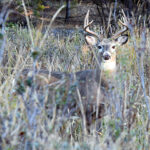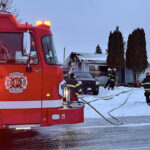Home »

Valley resident and coastal group outraged by wolf snaring
A Columbia Valley resident who has discovered 18 wolf snares near his home believes the provincial government is acting on behalf of a private ranching operation.
Brad Hill, a wildlife photographer and biologist from the valley, has discovered that the province has been placing wolf neck snares on Crown land near his home. He has located 18 snares centered near a bait pile of road-killed elk and mule deer, designed to draw wolves into the area.

Hill has also learned that the neck snares targeting wolves have been placed by provincial Conservation Officers at the behest of a privately held ranching operation that runs cattle on this particular Crown land.
The justification for the snaring is highly dubious with evidence of wolf predation being highly questionable at best, notes a press release by the Sidney-based Raincoast Conservation Foundation (RCF).
“Even if these snares successfully target the suspected wolves, the result is morally repugnant and ecologically illogical. But it could easily end up being much worse than that – in recent days I’ve seen coyote and cougar tracks in the area, and the snares don’t care what animal they strangle to death,” said Hill, who is hosting an online petition (www.naturalart.ca/voice/takeaction.html) opposing the neck snaring of wolves. After only a few days of posting, signatures supporting the petition number in the thousands.
In the press release with the headline “B.C. literally torturing wolves to “protect” cattle on Crown land” the RCF charges that the B.C. government is undertaking a wolf cull to benefit ranchers in the province.
“Although an increasing number of British Columbians are learning about the provincial government’s unscientific and unethical wolf cull, most are likely unaware their tax dollars are supporting not only the killing, but the sanctioned torturing of these animals. To compound matters, the BC government’s persecution and inhumane treatment of wolves is ostensibly being carried out to “protect” privately-owned cattle grazing on provincial Crown land,” the release states.
“Snares are the most inhumane legal traps in use today. They are primitive, unnecessarily brutal, and, unfortunately, inexpensive. The snare trap is merely a coil of wire fashioned into a noose at one end, with an anchor at the other end. Snares can catch animals by the neck, midsection, or a limb. As the animal tries to become free from the trap, the wire grows tighter around the animal’s body. This can result in broken legs, crushed organs, and suffocation. Animals caught in these traps die slow, painful deaths. There is also no way to ensure the targeted species is the only one trapped as neck snares, and other lethal traps, kill indiscriminately,” the release outlines.
“The province’s primary conservation philosophy regards wolves as a dispensable ‘resource’ or as ‘problem animals,’ which should be exploited and killed with little regard for the pain and suffering they might endure. Rather than being dedicated to the promotion of a responsible wildlife ethic and contemporary principles of wildlife conservation, government agencies are the primary enablers in the legalized destruction of wolves,” said Dr. Paul Paquet, senior scientist and large carnivore expert for Raincoast Conservation Foundation.
“The threat of wolves to livestock is routinely exaggerated by ranching and trophy hunting interests, despite hard evidence to the contrary. To put it in perspective, approximately 200,000 head of cattle are run on Crown land in B.C.; records indicate that over the last twelve months 162 depredations can be attributed to all predators, including but not limited to wolves,” added Chris Genovali, Raincoast executive director.
Contacted last week by e-KNOW to respond to the RCF press release, the Ministry of Environment replied: “The Minister is aware of the public sensitivity to this issue. Trapping regulations are the responsibility of the Ministry of Forests, Lands and Natural Resource Operations. The Conservation Office Service is responsible for controlling predators that kill or harass livestock under the Livestock Protection Program. The Conservation Officer Service provides thorough training and uses the best methods and equipment to avoid incidental catches.
“If a larger animal – such as a cow or a horse – gets caught in a neck snare, the device is designed to break and should release the animal unharmed. The Minister of Environment has asked for a review of the policy as it pertains to this practice.”
Ian Cobb/e-KNOW







